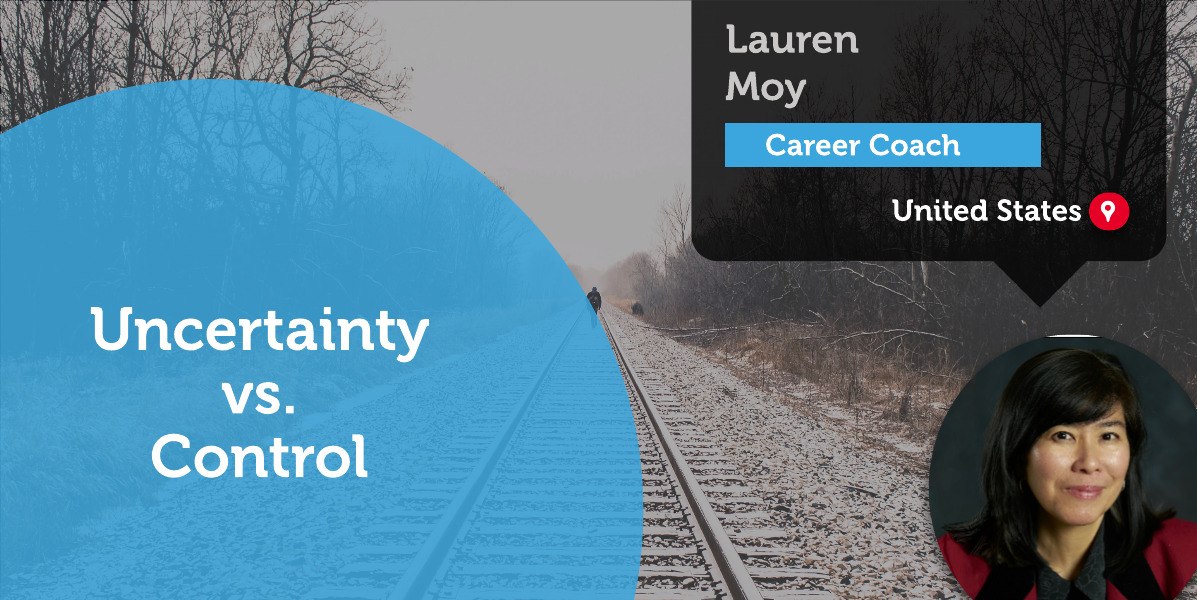A Coaching Power Tool By Lauren Moy, Career Coach, UNITED STATES

The Lack of Uncertainty vs. Control During Job Search
Many people do not like job search because of the lack of control or uncertainty that they feel. Sometimes job search happens as a result of graduation, but it can also happen due to being newly divorced, or laid off/fired. It is especially difficult when this happens, as people are in situations that are not of their choosing. This can leave a job seeker with feelings of fear, anxiety, and procrastination, and sometimes anger if they felt that the situation was unfair. These feelings can cause job seekers to be stuck. “Our lizard brain(the fight/flight/freeze part) goes into overdrive. The job search is fraught with psychological landmines- from fears of rejection to bouts of procrastination to self-esteem challenges to attacks of perfectionism.”1
Uncertainty vs. Control Definitions According to Merriam-Webster’s Collegiate Dictionary
Definition of Uncertainty – the state or quality of being doubtful
Definition of Control – the ability to direct the course of something
Many clients hire a Career Coach because they can feel uncertain about many aspects of the job search such as:
- Will my next employer and coworkers like me and will I like them? Will I belong?
- What career choices or jobs best align with who I am? ( including their strengths, skills, experience, interests, personality, values)
- How do I transition from where I am to where I want to be?
- How do I know if my resume, cover letter, and LinkedIn profile will attract employers and get interviews?
- Why am I going on interviews and not getting any offers?
- What is the hiring process and why was I not selected?
- If I reach out to a friend or past coworker for networking, will he/she be supportive?
Working with a Career Coach can help clients effectively navigate their job search by focusing on the areas of the job search that clients do have control over. This can help clients move from uncertainty and fear to control and confidence.
If we can help our brains tap into our natural curiosity and desire to learn, we can find ways to quiet the lizard.2
Step 1: Acknowledge and Normalize the Emotions2
- What is the current situation and what is the client feels when they focus on the job search? Acknowledge how you feel. It is OK. Everyone feels a lot of emotions during a job search.
- What would the ideal situation look or feel like?
- Is there a way that the client can channel his or her anxious energy into a productive task?
Step 2: Conduct Research. Determine Steps in the Job Search That You Have Control Over
- Know yourself – Take assessments such as the Myers Briggs Type Indicator and the Strong Interest Inventory. What are the strengths and skills that you enjoy, interests, experience, values, and personality? What brings you energy? What are you passionate about that the world needs and that companies are looking for?
- What career options fit you, as you research potential jobs and employers? Do both online types of research and have informational interviews with others in your field of interest. Make your vision of your new job as clear as possible.
- What steps can you take to prepare for that role? What new skills and knowledge can you learn?
- What steps in the job search process can you control? (creating a targeted resume, LinkedIn profile, elevator pitch, who you reach out to for networking meetings, practicing interview questions, which jobs you apply to, etc.
- What are your options? “Give yourself options. Don’t put all your hopes on one opportunity. The ability to choose greatly improves your feelings of control in a situation.”2
Step 3: Work Your Plan
- What are your specific career goals?
- What can you start doing today? What is your job search plan?
- The more you focus on what you can control, the quieter your lizard will become.
- How can you hold yourself accountable for your goals?
- Who can partner with you to enhance your accountability?
I have worked with hundreds of students and clients since 2012 who stayed focused and motivated on what they could control, and the feelings of uncertainty and fear slowly dissipated and they felt more in control and confident and they eventually landed that new job or promotion.
References
Katherine Evans, Ed. D. Why Your Brain Hates the Job Search, Psychology Today, https://www.psychologytoday.com/us/blog/career-transitions/201607/why-your-brain-hates-the-job-search
Katherine Evans, Ed. D. Teach Your Brain to Like the Job Search, Psychology Today, https://www.psychologytoday.com/us/blog/career-transitions/201607/teach-your-brain-the-job-search